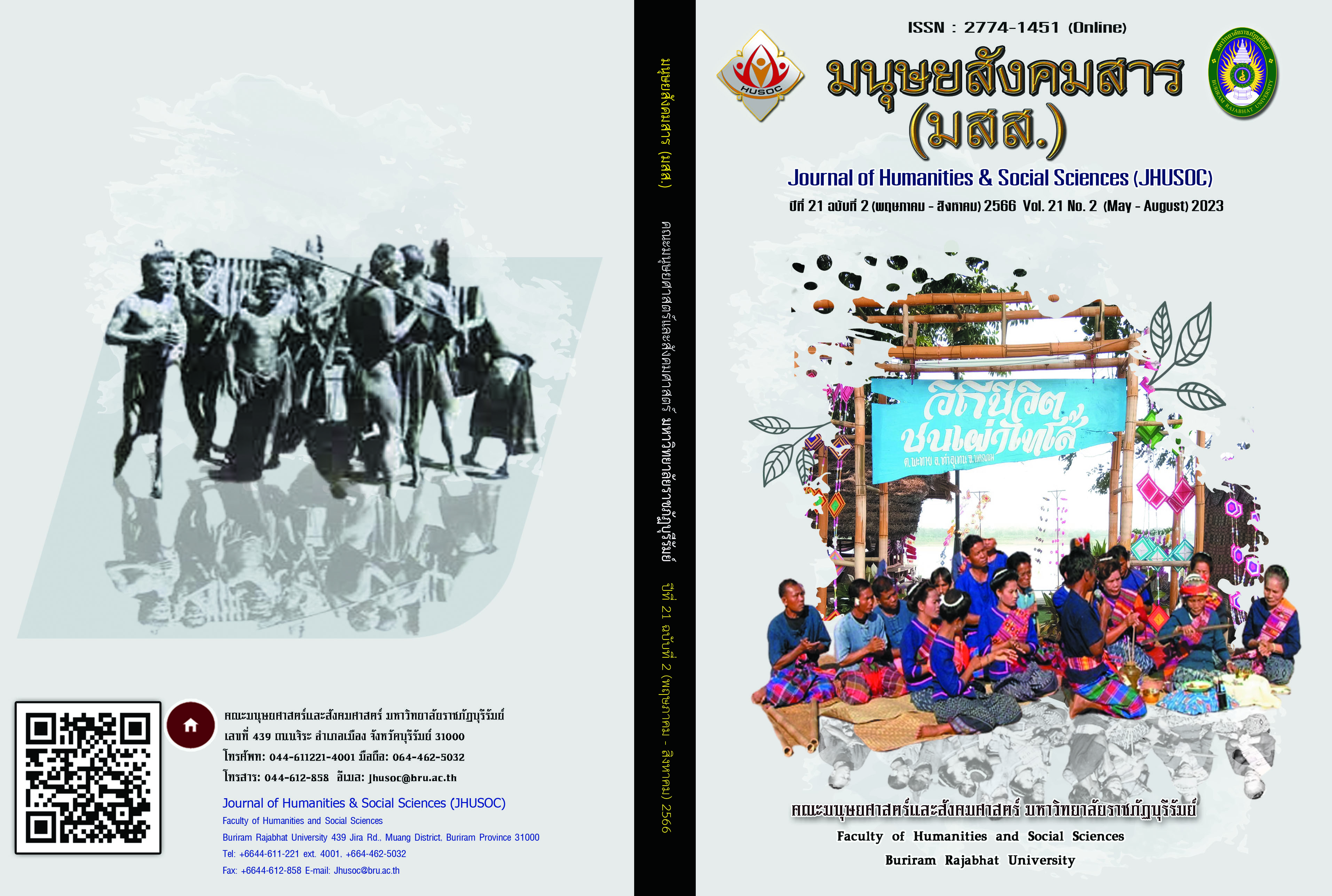การจัดการท่องเที่ยวโดยชุมชนแบบยั่งยืน
Main Article Content
บทคัดย่อ
การท่องเที่ยวโดยชุมชนอย่างยั่งยืนให้ความสำคัญกับการมีส่วนร่วมของภาคีสาธารณะ ในการพัฒนาองค์ความรู้ในท้องถิ่น เช่น บริบทชุมชน ประเพณี วัฒนธรรม และสินค้าเพื่อการท่องเที่ยว กระตุ้นแรงดึงดูดใจในการสร้างคุณค่าและมูลค่าทางเศรษฐกิจการท่องเที่ยวโดยชุมชนอย่างยั่งยืน จึงจำเป็นต้องมีการวางแผนและดำเนินกิจกรรมทั้งในระยะสั้นและระยะยาว การท่องเที่ยวโดยชุมชนอย่างยั่งยืนถูกนำเสนอให้เป็นทางเลือกของการพัฒนาที่ยั่งยืนเพื่อขจัดความยากจนลดผลกระทบต่อสิ่งแวดล้อมจากการท่องเที่ยว และสร้างความเจริญเติบโตทางเศรษฐกิจ สำหรับหลักการท่องเที่ยวชุมชนอย่างยั่งยืนประกอบด้วย 9 ประการได้แก่ 1) เป็นหลักการปฏิบัติที่ยั่งยืน 2) สร้างความสมดุลระหว่างชุมชนและผู้มาเยี่ยมชม 3) อำนวยความสะดวกใน การทำงานร่วมกัน 4) คืนอำนาจให้ชุมชน 5) เพิ่มผลประโยชน์ทางเศรษฐกิจ 6) ลดผลกระทบเชิงลบที่อาจเกิดขึ้น 7) ปรับตัวให้เข้ากับสถานการณ์ที่เปลี่ยนแปลง 8) มาตรการและประเมินผลกระทบ และ 9) สร้างความยืดหยุ่น ดังนั้น การจัดการท่องเที่ยวโดยชุมชนอย่างยั่งยืนนั้นเป็นการสร้างความสมดุลระหว่างผลประโยชน์ของผู้มีส่วนได้ส่วนเสีย
Article Details

อนุญาตภายใต้เงื่อนไข Creative Commons Attribution-NonCommercial 4.0 International License.
เนื้อหาและข้อมูลในบทความที่ลงตีพิมพ์ในวารสารทดสอบระบบ ThaiJo2 ถือเป็นข้อคิดเห็นและความรับผิดชอบของผู้เขียนบทความโดยตรงซึ่งกองบรรณาธิการวารสาร ไม่จำเป็นต้องเห็นด้วย หรือร่วมรับผิดชอบใดๆ
บทความ ข้อมูล เนื้อหา รูปภาพ ฯลฯ ที่ได้รับการตีพิมพ์ในวารสารทดสอบระบบ ThaiJo2 ถือเป็นลิขสิทธิ์ของวารสารทดสอบระบบ ThaiJo2 หากบุคคลหรือหน่วยงานใดต้องการนำทั้งหมดหรือส่วนหนึ่งส่วนใดไปเผยแพร่ต่อหรือเพื่อกระทำการใดๆ จะต้องได้รับอนุญาตเป็นลายลักอักษรจากวารสารทดสอบระบบ ThaiJo2 ก่อนเท่านั้น
เอกสารอ้างอิง
Baltescu, C. A. (2020). Responsible Tourism Practices Implemented by Tourism Companies. Bulletin of the Transilvania University of Brasov. Series V: Economic Sciences, 49-54.
Berzina, K., Medne, I., & Tsoy, M. (2017). Tourism enterprise cooperation specifics: Comparative study of Riga and Novosibirsk travel agencies.
Chatkaewnapanon, Y., & Lee, T. J. (2022). Planning Sustainable Community-Based Tourism in the Context of Thailand: Community, Development, and the Foresight Tools. Sustainability 2022, 14, 7413.
Costencu, M., & Dobrescu, C. N. (2013). Substantiating The Development Strategies For Tourism In Protected Areas. Studies and Scientific Researches. Economics Edition, (18).
Dangi, T. B., & Petrick, J. F. (2021). Augmenting the role of tourism governance in addressing destination justice, ethics, and equity for sustainable community-based tourism. Tourism and Hospitality, 2(1), 15-42.
Dolezal, C., & Novelli, M. (2022). Power in community-based tourism: Empowerment and partnership in Bali. Journal of Sustainable Tourism, 30(10), 2352-2370.
Fan, K. H. F., Ng, S. L., & Bayrak, M. M. (2023). Appraising the community in community-based tourism. Tourism Geographies, 25(2-3), 594-614.
Gao, Q., Fang, C., & Cui, X. (2021). Carrying capacity for SDGs: A review of connotation evolution and practice. Environmental Impact Assessment Review, 91, 106676.
Giampiccoli, A., & Saayman, M. (2018). Community-based tourism development model and community participation. African Journal of Hospitality, Tourism and Leisure, 7(4), 1-27.
Hussin, R., & Kunjuraman, V. (2014). Sustainable community based tourism (CBT) through homestay programme in Sabah, East Malaysia. Proceeding of the Social Sciences Research ICSSR, 2014, 41-61.
Lertgrai, P., & Nillakan, L. (2016). Fieldwork and data collection in local communities. Narkbhutparitat Journal Nakhon Si Thammarat Rajabhat University, 8(2), 1-10. [in Thai]
Masseno, M. D., & Santos, C. T. (2018). Between footprints: Balancing Environmental sustainability and privacy in smart tourism destinations. Revista Eletrônica do Curso de Direito da UFSM, 13(1), 411-435.
Mendonça, V., Varajão, J., & Oliveira, P. (2015). Cooperation networks in the tourism sector: multiplication of business opportunities. Procedia Computer Science, 64, 1172-1181.
Nevenka, Nićin., Anka, Bulatović., Vojislava, Grbić., Evropski, univerzitet, Brčko, distrikt, Brčko, Bih. (2018). The role of management in management of companies. Phys.Rev.47,777-780.
Nair, V., & Hamzah, A. (2015). Successful community-based tourism approaches for rural destinations: The Asia Pacific experience. Worldwide Hospitality and Tourism Themes.
Pencarelli, T., & Dini, M. (2016). The tourism intermediation system: The relationship between travel a gencies and tour operators. International Journal of Economic Behavior (IJEB), 6(1), 97-112.
Rocharungsat, P. (2008). Community-based tourism in Asia. In Building community capacity for tourism development (pp. 60-74). Wallingford UK: CABI.
Ruchuwararak, P., Donsom. J., & Sosut, A. (2021). Development and adaptation of the community markets: An alternative for integrated agricultural development. Journal of Humanities & Social Sciences (JHUSOC), 19(1), 227-250. [in Thai]
Ruhanen-Hunter, L. M. (2006). Sustainable tourism planning: An analysis of Queensland local tourism destinations. Tourism review, 65(4),4-16.
Sammy, J. (2008). Examples of effective techniques for enhancing community understanding of tourism. Building community capacity for tourism development, 75-85.
Suansri, P. (2003). Community based tourism handbook (pp. 11-14). Bangkok: Responsible Ecological Social Tour-REST.
Uswathul, H., Sampada, K., Swain., & Babu, G., (2022). Community centered management of ecological resources for sustainable tourism: Benefits and costs. International Journal of Professional Business Review, 7(1), 01-31.
Yanes, A., Zielinski, S., Diaz Cano, M., & Kim, S. I. (2019). Community-based tourism in developing countries: A framework for policy evaluation. Sustainability, 11(9), 2506.
Zeng, B., Ryan, C., Cui, X., & Chen, H. (2015). Tourism-generated income distribution in a poor rural community: A case study from Shaanxi, China. Journal of China Tourism Research, 11(1), 85-104.


